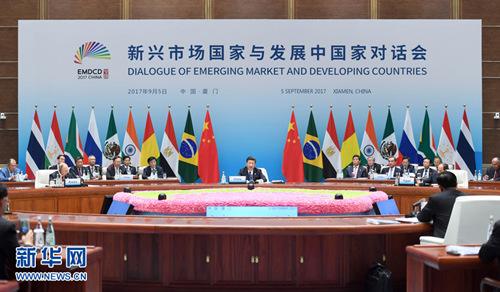深化互利合作 促進共同發展
Strengthening Mutually-Beneficial Cooperation for Common Development
——在新興市場國家與發展中國家對話會上的發言
– Remarks at the Dialogue of Emerging
Market and Developing Countries
中華人民共和國主席
習近平
H.E. Xi Jinping, President of the
People’s Republic of China
2017年9月5日,廈門
Xiamen, 5 September 2017

各位同事,
女士們,先生們,朋友們:
Dear Colleagues,
Ladies and
Gentlemen,
Dear Friends,
上午好!現在,我宣布新興市場國家與發展中國家對話會開始。
Good morning! I
would like to announce that the Dialogue of Emerging Market and Developing
Countries now begins.
熱烈歡迎大家出席新興市場國家與發展中國家對話會。金磚國家在領導人會晤期間,注重同其他新興市場國家和發展中國家進行溝通交流。中方今年有所創新,邀請了來自不同地區有代表性的國家出席今天的對話會,相信這種對話有利于新興市場國家和發展中國家加強團結合作,有利于金磚機制自身發展。
I warmly welcome
you all to the Dialogue. When we BRICS leaders meet, we attach importance to
communicating and interacting with other emerging market and developing
countries. This year, the Chinese side has built on past practices and tried
something new by inviting representative countries from different regions to
today’s dialogue. I believe such kind of dialogue will help strengthen the
solidarity and cooperation among emerging market and developing countries and
contribute to the development of the BRICS mechanism.
今天,大家能夠聚到一起非常難得。很多同事是遠道而來,有的還專門為出席對話會調整了日程安排,我對此表示感謝。我期待同大家圍繞“深化互利合作,促進共同發展”的主題,共商發展合作大計,為深化南南合作、落實2030年可持續發展議程注入強勁動力。
It is indeed not
easy for us to get together today. Many colleagues have traveled long
distances, and some have even rescheduled their program to attend the dialogue.
I extend my appreciation to you all. I look forward to our discussion on the
important issue of development cooperation under the theme of “Strengthening
Mutually-Beneficial Cooperation for Common Development”, which I believe will
lend a strong impetus to deepening South-South cooperation and implementing the 2030 Agenda for Sustainable
Development.
進入新世紀以來,新興市場國家和發展中國家群體性崛起,成為不可逆轉的時代潮流。近幾年,這些國家對世界經濟增長的貢獻率穩居高位,2016年達到80%,是當之無愧的主引擎。近期,世界經濟呈現向好態勢,國際貿易和投資回升,新一輪科技和工業革命蓄勢待發,新產業、新技術、新業態層出不窮。從這個意義上講,新興市場國家和發展中國家面臨難得的發展機遇。
Since we entered
the 21st century, the collective rise of emerging market and developing
countries has become an irreversible trend of our times. In recent years, these
countries have made more contribution to global economic growth than others.
Accounting for 80% of the global growth in 2016, they are worthy of the
reputation as the primary engine of the world economy. As the latest
developments suggest, the global economy is looking up and international trade
and investment are picking up. A new round of technological and industrial
revolution is gathering momentum. New industries, new technologies and new
business models are emerging. In this context, emerging market and developing
countries face a rare opportunity of development.
同時,我們也要看到,世界經濟下行風險和不確定性在同步上升,多邊貿易談判舉步維艱,《巴黎協定》落實遭遇阻力。部分國家內顧傾向加重,參與國際發展合作意愿減退,其政策調整的外溢效應仍在發酵。世界經濟進入新舊動能加速轉換的關鍵期,各方圍繞利益、規則的博弈日益激烈,新興市場國家和發展中國家所處的外部環境更加復雜嚴峻。
That said, we
should not lose sight of the growing risks of downward pressure and
uncertainties in the world economy. Multilateral trade negotiations are
stalled, and the implementation of theParis Agreement on Climate Change is encountering resistance. Some
countries have become more inward-looking and less inclined to engage in
international development cooperation, and spillovers of their policy
adjustment are deepening. As the world economy enters a crucial stage where new
drivers of growth are replacing traditional ones at a quicker pace, there is
mounting competition focused on interests and rules. This makes the external
environment for emerging market and developing countries more complex and
challenging.
逆水行舟,不進則退。面對新的形勢,新興市場國家和發展中國家需要同舟共濟,堅定信心,聯手營造有利發展環境,努力實現更大發展,為世界經濟增長作出更大貢獻。
A boat sailing
against the currents has to forge ahead or risks falling behind. Given the new
circumstances, emerging market and developing countries need to pull together
and work hand in hand more confidently to foster a favorable environment for
greater development, and make bigger contribution to global growth.
(一)加強團結協作,共同構建開放型世界經濟。當今時代,各國是相互依存、彼此融合的利益共同體,開放包容、合作共贏是唯一正確的選擇。搞以鄰為壑、零和游戲無助于世界經濟增長,新興市場國家和發展中國家將是首當其沖的受害者。我們要為開放型世界經濟鼓與呼,堅定支持多邊貿易體制,反對保護主義,引導經濟全球化實現包容、普惠的再平衡。要加強立場協調,推動世界貿易組織第十一屆部長級會議取得積極成果,推進多哈發展回合剩余議題,并為多邊貿易體制發展明確方向。要努力提升新興市場國家和發展中國家在全球經濟治理中的代表性和發言權,推動形成更加公正合理的國際經濟秩序。
First, we need
to work more closely to build an open world economy. In an increasingly
interdependent and integrated world where countries form a community of shared
interests, openness, inclusiveness and win-win cooperation are the only viable
option. The beggar-thy-neighbor practice or zero-sum game will not help world
economic growth, but will undermine, first and foremost, the interests of
emerging market and developing countries. We need to advocate an open world
economy, firmly support the multilateral trading regime, oppose protectionism,
and rebalance economic globalization to make it more inclusive and equitable.
We need to strengthen coordination on positions, work toward a positive outcome
at the upcoming 11th WTO Ministerial Conference, make progress on the remaining
items of the Doha Development Round, and provide direction to the multilateral
trading regime. We need to promote greater representation and voice of emerging
market and developing countries in global economic governance, and foster an
international economic order that is fairer and more equitable.
(二)加強團結協作,共同落實2030年可持續發展議程。發展是新興市場國家和發展中國家的第一要務。我們要立足自身國情,把可持續發展議程同本國發展戰略有效對接,持之以恒加以推進,探索出一條經濟、社會、環境協調并進的可持續發展之路。要呼吁國際社會把發展置于宏觀政策協調的重要位置,發揮聯合國作用,利用好可持續發展高級別政治論壇,加快落實可持續發展議程。要敦促發達國家信守承諾,根據共同但有區別的責任等原則,增加對發展中國家支持力度。近期,聯合國發展系統醞釀改革,我們要推動改革聚焦發展,增加投入,真正服務廣大發展中國家需要。
Second, we need
to work more closely to implement the 2030
Agenda for Sustainable Development. Development remains the top priority
for emerging market and developing countries. We need to implement our national
development strategies in the context of the Sustainable Development Agenda and in light of our respective
national conditions. This will help us find a path of sustainable development
featuring coordinated economic, social and ecological progress. We need to call
on the international community to place development high on the agenda of
macro-policy coordination, better leverage the role of the United Nations, make
good use of the High-level Political Forum on Sustainable Development, and
accelerate the implementation of the Sustainable
Development Agenda. We need to urge developed countries to honor their
commitments, to observe such principles as common but differentiated
responsibilities, and to increase support to developing countries. As the
United Nations is considering reform of its development system, we need to
ensure that the reform will focus on development and bring more input to truly
serve the need of developing countries.
(三)加強團結協作,共同把握世界經濟結構調整的歷史機遇。新一輪科技和工業革命催生新的發展動能,也帶來千載難逢的發展機遇。抓住這個機遇,新興市場國家和發展中國家就可能實現“彎道超車”。失去這個機遇,南北鴻溝、發展失衡將進一步擴大。因此,我們必須勇于創新、敢于改革,大刀闊斧推進經濟結構調整,挖掘發展內生動力。同時,要解決好社會政策托底問題,重視保障和改善民生。我們應該相互以基礎設施建設、科技、教育、工業等領域為重點,加強發展戰略對接、經驗交流、能力建設合作,助力彼此經濟發展。
Third, we need
to work more closely to seize the historic opportunities of world economic
restructuring. A new round of technological and industrial revolution has
generated new growth drivers and brought to us development opportunities like
never before. Seizing the opportunities, emerging market and developing
countries may even get ahead in development. If the opportunities are missed,
the North-South gap and development imbalance will grow even wider. We must
take bold steps of innovation and reform, press ahead with economic structural
adjustment, and invigorate domestic drivers for growth. At the same time, we
must formulate our social policy in a way that meets people’s basic needs and
work all out to ensure a better life for our people. We need to enhance
complementarity of our development strategies, particularly in such areas as
infrastructure development, science and technology, education and industry. We
also need to strengthen cooperation in best practices sharing and
capacity-building as a way to support each other’s pursuit of economic
development.
(四)加強團結協作,共同建設廣泛的發展伙伴關系。一花不是春,孤雁難成行。新興市場國家和發展中國家面臨相似的發展任務,深化務實合作,發揮互補優勢,能產生“一加一大于二”的積極效應。我們要利用好金磚國家、七十七國集團等機制,在更大范圍、更廣領域開展南南合作,攜手應對各種全球性挑戰,培育聯動發展鏈條,實現聯合自強。今年,中方邀請有代表性的發展中國家出席這次對話會,目的就在于構建伙伴網絡,建設各國發展共同體、命運共同體。
Fourth, we need
to work more closely to build extensive development partnerships. As a Chinese
saying goes, “A single flower does not herald spring; a single wild goose
cannot make a formation.” Emerging market and developing countries face similar
development tasks. By deepening practical cooperation and tapping into
complementarity, we can multiply the impact. We need to make good use of BRICS,
G77 and other similar mechanisms, broaden South-South cooperation on a larger
scale, and jointly address global challenges. We also need to forge chains of
interconnected development and seek strength through unity. The purpose of
inviting some representative developing countries from different regions to
this Dialogue is to foster a network of partnerships and to build a community
of common development and shared future.
各位同事!
Dear
Colleagues,
中國高度重視2030年可持續發展議程,制定了落實議程的國別方案,建立了可持續發展創新示范區,在經濟、社會、環境等領域取得多項早期收獲。為推動國際發展合作,中方將利用南南合作援助基金、中國—聯合國和平與發展基金、氣候變化南南合作基金等機制,積極助力其他發展中國家落實可持續發展議程。
China sets great
store by the 2030 Agenda
for Sustainable Development. We have developed a national program to
implement the Agenda and set up innovation demonstration
zones on sustainable development. Thanks to these efforts, we have attained
early harvests on economic, social, environmental and many other fronts.
Internationally, China will work through such mechanisms as the Assistance Fund
for South-South Cooperation, China-UN Peace and Development Fund and
South-South Climate Cooperation Fund to boost cooperation on development and
help fellow developing countries in implementing the Sustainable Development Agenda.
我愿借此機會宣布,中國將在南南合作援助基金項下提供5億美元援助,幫助其他發展中國家應對饑荒、難民、氣候變化、公共衛生等挑戰。中方還將利用國際發展知識中心、南南合作與發展學院等平臺,同各國加強發展經驗交流和能力建設合作,并在未來1年為其他發展中國家提供4萬個來華培訓名額。
Here, I wish to
announce that China will provide 500 million US dollars to the Assistance Fund
for South-South Cooperation. The money will be used to help fellow developing
countries tackle famine, refugee, climate change, public health and other
challenges. China will enhance development experience-sharing and
capacity-building cooperation with other countries through such platforms as
the Center for International Knowledge on Development and the Academy of
South-South Cooperation and Development. We will provide other developing
countries with 40,000 training opportunities in China in the coming year.
4年前,我提出共建“一帶一路”倡議,得到國際社會熱烈響應。今年5月,中國成功主辦“一帶一路”國際合作高峰論壇,同有關國家和國際組織一道勾畫“一帶一路”建設合作愿景,提出一系列支持沿線國家可持續發展的務實舉措。各方都認為,共建“一帶一路”倡議的理念和方向,包括政策溝通、設施聯通、貿易暢通、資金融通、民心相通,同2030年可持續發展議程高度契合,完全能夠加強對接,相互促進。
Four years ago,
I put forward the idea of building a Silk Road Economic Belt and a 21st Century
Maritime Silk Road. The initiative received warm response from the
international community. In May this year, China hosted a successful Belt and
Road Forum for International Cooperation. Together with the participating
countries and international organizations, we outlined a vision of future
cooperation under the Belt
and Road Initiative and
proposed concrete measures to support countries along the Belt and Road in pursuing
sustainable development. It was widely agreed that the philosophy and vision of
the Belt and Road Initiative and its focus on policy,
infrastructure, trade, financial and people-to-people connectivity have much in
common with the2030 Agenda for Sustainable Development and the two can very well
complement and reinforce each other.
“一帶一路”是一條合作之路,更是一條希望之路、共贏之路。中方將結合“一帶一路”國際合作高峰論壇成果落實,同有關國家在基礎設施互聯互通、產能合作、科技創新等領域開展合作。
The Belt and
Road is as much a path of cooperation as one of hope and mutual benefit. As a
follow-up to the outcomes of the Belt and Road Forum, China will develop
cooperation with interested countries in infrastructure connectivity,
production capacity, technological innovation and other fields.
中國古人說:“天下事有難易乎?為之,則難者亦易矣;不為,則易者亦難矣。”新興市場國家和發展中國家代表著世界發展的未來。促進國際發展合作、落實可持續發展議程是我們應有的擔當。讓我們攜起手來,一起開辟一條公平、開放、全面、創新的發展之路。
A Chinese writer
over two hundred years ago once observed, “Is there anything too hard in the
world? With determined efforts, a hard task becomes easy; otherwise, an easy
job may become difficult.” Emerging market and developing countries represent
the future of world development. It is our duty to promote international
cooperation on development and implement the Sustainable
Development Agenda. Let us work together to blaze a new path to
development that is fair, open, comprehensive and innovative.
謝謝大家。
Thank you.















